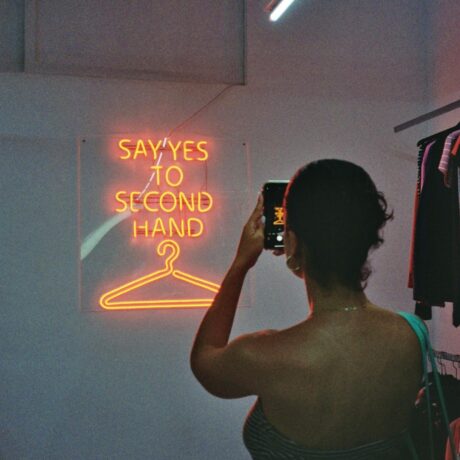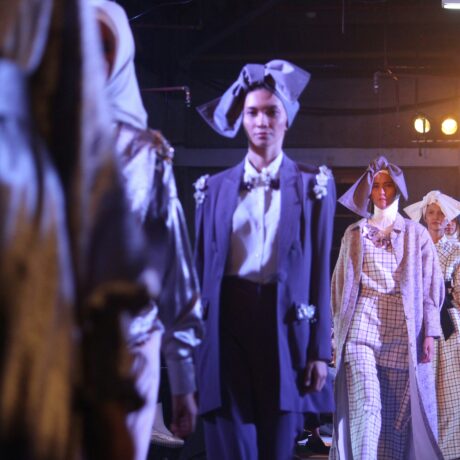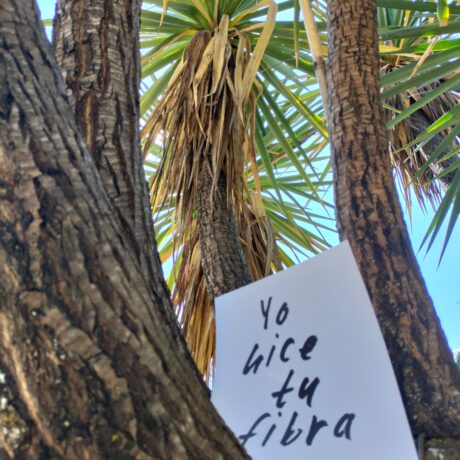Fashion Revolution Guatemala’s Alexandra Cerezo is recognised by the Young Activists Summit
When Fashion Revolution got started in 2013, we began with a group of passionate individuals mainly based in the UK, but it was clear that our message had global relevance and power. Since its inception, we’ve relied on a network of global volunteers, who helped to shape the open source framework to activate in their countries. One of those amazing volunteers is team Guatemala leader, Alexandra Cerezo. Alexandra is a brand strategist specializing in textiles and sustainability. This month, her work is being recognised by the UN’s Young Activist’s Summit. Below, we speak to Alexandra about her journey with Fashion Revolution.
@Fash_Rev: Congratulations Alexandra! Can you tell me a little bit about how you came to work in the area of fashion and sustainability?
Alexandra: Thank you so much! Working in the area of fashion and sustainability was, in fact, serendipitous. I’ve always felt a strong connection with nature, specifically the ocean and I became aware of the impact of pollution and climate change quite early in my life. So, whenever I had the chance, I would go to a beach clean up. I didn’t yet know how the fashion industry impacted nature, even less the social repercussions of it all. I’m mentioning all of this because it connects to where I find myself today.
One day, back when I was studying Fashion Design, a teacher screened the documentary, The True Cost. A life changing experience for many of us, I believe. I couldn’t look the other way after that and if I’m being completely blunt, I tried. I really tried to continue shopping as if I didn’t know better and to create without thought or commitment to bettering the processes, because it’s easier to do so. It’s easier to ignore such a harsh reality. The thing is that, I couldn’t stop thinking about the makers and how nature was being impacted by poor design and waste management. So, I started thinking: How can I connect my passion with my love for nature and people? How can I create a positive impact with what I do? And these questions have driven me since. Whatever I do, I need it to create a positive impact for the environment and the people in it.
I started thinking: How can I connect my passion with my love for nature and people? How can I create a positive impact with what I do? And these questions have driven me since.
At the time, I stopped everything that I was doing and decided to take a break to rethink. When I came back from that break, I applied for an internship at a creative studio (Studio MEÜS) that specializes in textile design and production because I needed to learn. It was the best decision I’ve made because there I received the guidance and support that I needed and still do. Now, I’m currently working on a personal project that is meant to educate about the connection of biodiversity, production processes and textiles through upcycling as a first stage (more to come!). We have a design problem and what we need now is to teach the new generations how to design with the natural ecosystems in mind because we’ve got the technology, now we need to observe and learn from the one thing that works perfectly: The Earth. The system, as you know, needs to be challenged. It can no longer be linear because it is simply not natural, thus not sustainable. Every natural system that surrounds us has a cycle that goes and comes around. Why are we the only creatures that decided to have a linear system? That’s beyond me. We need the redesign design itself and if I can support that in any way, I will.
@Fash_Rev: When did you first become involved with Fashion Revolution? Can you tell us about starting a team in Guatemala?
Alexandra: I first became involved with Fashion Revolution years ago, as a citizen and believer of the cause. It was not until last year that I met a couple of incredible women that, like me, saw the need to educate on the subject of sustainability and the need to change the fashion industry in general. These women are now part of the team here in Guatemala and I couldn’t be happier. We wanted to create a platform that would educate about sustainable fashion and all that it really means. So, when thinking about possible partners for this project, we thought Fashion Revolution would be perfect and got introduced. While on discussion, we were asked if we wanted to partner or if we wanted to actually take the country representation and of course, we took the opportunity because even though we might not know it at the beginning, it was exactly what we were looking for. From there, everything just flowed, as if it was meant to be. We now have a team of 8 (soon to be 9!) incredible volunteers in less than a year. It was time. We’re a young team, in every sense of the word, and there’s a lot to be learned but we’re committed, passionate and confident we can make a change.
@Fash_Rev: What is the fashion industry like in Guatemala? Your team works heavily on designer education and artisanship, we’d love to hear about that too!
Alexandra: The fashion industry in Guatemala has been in constant growth for the past 5-10 years, in different aspects. I think the word I’d use to describe the industry in Guatemala is rich because we’ve got industrial production, which happens to be one of main economic sectors, artisanship, and design.
Most of the industrial production is exported. Interestingly enough, we import a lot of the materials used in the industry and also an incredible amount of second hand clothing from the United States. This affects the economy of small local workshops. Another interesting thing to point out is that even though Guatemala happens to be a production country, sourcing materials as a designer or small workshop happens to be difficult because of minimum requirements from the factories.
On the other hand, we’ve got artisanship. A cultural heritage passed from generations and even though still running strong in many places of the country, the younger generations are lacking interest because it’s not always profitable thus, not sustainable since it takes a lot of time and resources. Designers value the artisans work and promote artisan work through their own, along with economic and social support, something that has created a positive impact but the designers can’t do it alone. Both the artisans and the consumers need to be educated on the value of their work.
The reality is that a lot of positive things are happening at the moment. Guatemala has incredible design, a lot of it with purpose, and a magical heritage but there’s a long way to go. Many environmental and social laws are constantly overseen for the sake of profit and as a result, the general economy might be growing but the individual is not. Making a living out of the fashion industry alone is not often seen in Guatemala. There are successful cases of course, but this is not the norm. There needs to be more support from the government and law enforcement, without a doubt. New policies need to be created because the industry itself has evolved.
Many environmental and social laws are constantly overseen for the sake of profit and as a result, the general economy might be growing but the individual is not.
The hope is not lost though. There are a lot of people that work everyday to create opportunities for both manufacturers and designers and that believe in Guatemala’s potential. In the end, most people support each other and that’s a positive asset to count on.
@Fash_Rev: This was your first Fashion Revolution week leading a team! How did your team activate during Fashion Revolution Week 2020? What were the highlights?
Alexandra: Yes! It was crazy and incredibly amazing! We literally finished setting up the team and social media a month before Fashion Revolution Week but we were extremely excited because what better way to introduce ourselves than this week?
Our initial plan was to partner with other platforms to do a couple of events such as a launch party and a Stitch n’ Bitch but just a couple of weeks before the country shut down so we had to recreate these events and run for our lives! The incredible thing was that when people found out that Fashion Revolution Guatemala was active they immediately contacted us to co-create events. So, we ended up doing a screening of the True Cost with a sustainable fashion photography agency, an incredible webinar, and a live design studio tour that received great feedback. Plus, a couple of live talks with designers from other countries. I believe we had a great first Revolution Week. I do remember sleeping for about 12 hours after it ended but it was all worth it. Can’t wait for the next one, specially now that the team has grown and connected with the global network in different ways.
@Fash_Rev: What is the Young Activist’s Summit award?
Alexandra: The Young Activist Summit Award is a prize given to a line-up of young activists for the achievement they’ve accomplished in the fight to defend sustainability and human rights in order to create a better future for future generations. The award was created to support and help us, the activists, achieve our goals, as well as to raise awareness of the causes we’re fighting for with other young people and decision makers.
@Fash_Rev: How can people around the world stay up to date with team Guatemala?
Alexandra: The most active platform we’ve got at the moment is Instagram (@fash_revgt). We’re actively posting and engaging through that platform. We’re a message away and any of the team members will be more than happy to chat.








